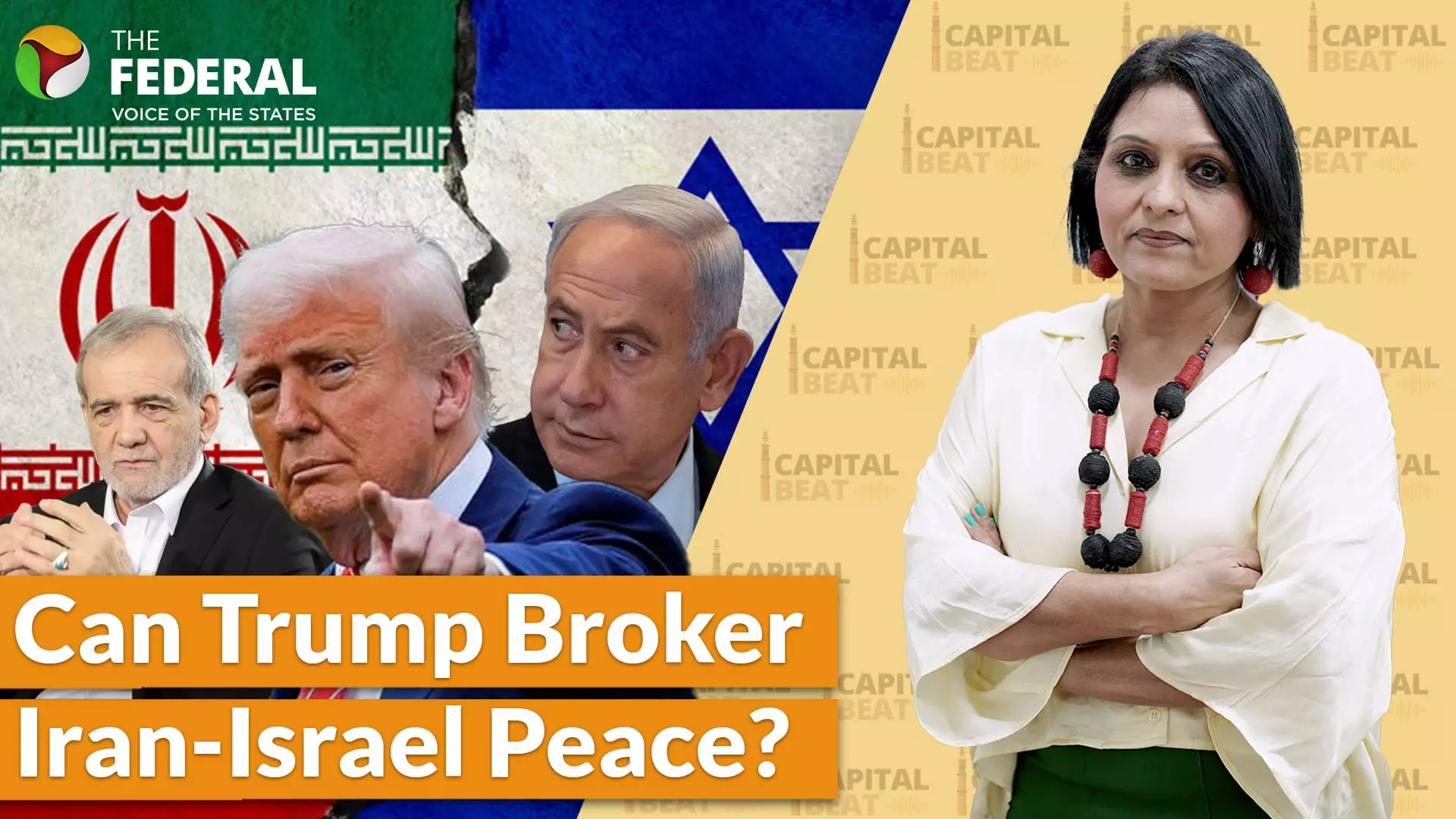
Iran Israel peace
Will Trump broker Iran-Israel peace? What's India's stand | Capital Beat
As missiles rain down on Tel Aviv and Tehran, experts debate if Trump or China can halt this spiraling war and what India’s diplomatic silence really means

In this episode of Capital Beat, international affairs expert Aftab Kamal Pasha, veteran journalist Sanjay Kapoor, and author Pushparaj Deshpande engaged in a fiery debate on the latest Iran-Israel military escalation.
As ballistic missiles strike Tel Aviv and Haifa, and Israeli air raids decimate Tehran's infrastructure, the panel examined whether US President Donald Trump or China can broker peace and how India's diplomatic stance is being tested amid global realignments.
War escalation and Iran's retaliation
Professor Pasha traced the roots of the crisis to the October 2023 Hamas-Israel conflict, which spiraled into broader regional aggression. Israel's attacks extended to Lebanon, Yemen, and now Tehran, drawing Iran into direct confrontation.
"This is no longer just about Gaza," Pasha warned. "Iran has responded massively across Israel—Tel Aviv, Haifa, Jerusalem—with ballistic and hypersonic missiles that pierced the Iron Dome and David's Sling defenses."
He noted Iran’s calculated military build-up and said the West underestimated its preparedness. "Iran has suffered serious losses—nuclear facilities, scientists, generals—but its counterstrikes prove it is far from fragile," he said, cautioning that the deeper motive lies in a larger geopolitical fault line: the US, Israel and its NATO allies versus a China-Russia-Iran-North Korea axis.
Trump’s peace claim questioned
As Trump claims he can broker a peace deal, both Pasha and Sanjay Kapoor expressed scepticism.
Pasha emphasised that Trump’s earlier withdrawal from the JCPOA (Iran nuclear deal) and tacit support for Israeli espionage efforts inside Iran have eroded trust. "Iran won't talk peace with the man who greenlit Mossad operations to assassinate its leaders," he said.
Kapoor pointed to Trump’s political limitations: "The Israeli lobby in the US is too powerful. Trump, like Biden, can’t resist their influence. Netanyahu won’t be easily pressured." He added that recent attacks on Israel's military infrastructure—including the Rafael defence complex—indicate that Iran is not only retaliating but strategically weakening Israel's war machine.
China's emerging role
The discussion also explored China's role as a potential mediator. Pasha emphasised China's stake in Iran due to its energy investments and the BRI-linked infrastructure. "China cannot allow regime change in Tehran—it’s too close to their strategic zone," he said.
Kapoor, however, was less optimistic. "Trust is the issue. All the big powers—US, China, Russia—are seen as partisan by one side or the other. Mediation credibility is thin," he argued. Still, both panelists agreed that China’s diplomatic voice might help cool tensions even if it cannot end the war outright.
India's diplomatic dilemma
Deshpande delivered a sharp critique of India’s muted stance. With Prime Minister Narendra Modi attending the G7 summit in Canada, Deshpande questioned New Delhi’s failure to condemn Israel’s aggression or safeguard Indian citizens in the region.
"Around 1600 Indians are in Iran, thousands more in Israel. Yet, no Operation Ganga, just vague travel advisories. It’s abdication of responsibility," he said.
He criticised the BJP government’s "blind support" for Israel, arguing it undermines India’s case on Pakistan-occupied Kashmir and alienates allies like Iran. "Iran supported us after our nuclear tests with cheap oil. Now we back their enemy?" he asked.
Fallout for India and Global South
Deshpande warned that India's pro-Israel tilt could backfire diplomatically and economically. "If the Hormuz Strait is closed, oil prices will spike. Inflation will surge," he said. He stressed that this conflict has exposed India’s "knee-jerk, transactional" foreign policy.
"We're isolated—no leverage with Russia, China, or even the West. Modi’s foreign policy has lost us our leadership in the Global South."
Pasha echoed concerns that India risks being sidelined in forums like BRICS. "If Iran survives this war, BRICS may replace India with Iran," he cautioned, underscoring the gravity of India's strategic indecisiveness.
A shifting world order
In his closing remarks, Deshpande argued that the global order is undergoing a dangerous shift. "Far-right regimes are colluding globally. Norms of international law are crumbling. War is becoming normalized." He urged progressive forces in India and beyond to present an alternative foreign policy vision—one rooted in restraint, diplomacy, and strategic autonomy.
Pasha added that if Iran pulls out of the NPT, the non-proliferation regime could collapse, prompting a dangerous arms race. "Iran could emerge as a nuclear state not out of ambition, but self-preservation. And the West will have only itself to blame."
The content above has been transcribed from video using a fine-tuned AI model. To ensure accuracy, quality, and editorial integrity, we employ a Human-In-The-Loop (HITL) process. While AI assists in creating the initial draft, our experienced editorial team carefully reviews, edits, and refines the content before publication. At The Federal, we combine the efficiency of AI with the expertise of human editors to deliver reliable and insightful journalism.

